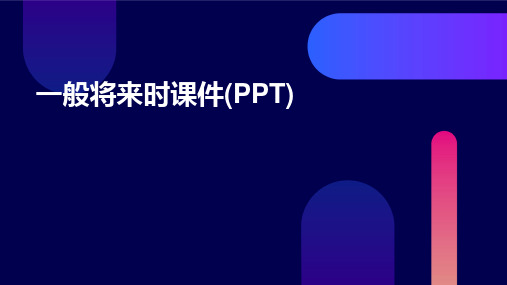七年级下册Module 4复习一般将来时 will课件
一般将来时(21张PPT)初中英语专项复习课件(2)

【典例1】My sister wants a new dress. She ____ it
to the party.
A. wears
B. is going to wear
C. wore
D. has worn
考查动词的时态。句意:我妹妹想要一条新裙子。她想 派对上穿。由My sister wants a new dress可知动作还未执 行,故用be going to形式,表示有计划做某事。
【典例2】He ________ her a beautiful hat on her next
birthday.
【典例3】 —Which team do you think ______ the game? —Hard to say. There are still ten minutes before it ends. A. won B. has won C. will win D. wins
考查动词的时态。句意:—你认为哪个队会赢这场 比赛?—不好说。还有十分钟才结束。根据句意判 断为一般将来时,选用will+动词原形。
volleyball match.
A. will watching B. watches
C. is watching
D. are going to watch
考查动词的时态。句意:后天,他们将看一场排球 赛。The day after tomorrow为一般将来时标志词, 选用将来时结构be going to do,故答案选D。
【典例2】There __________ a meeting tomorrow
最新一般将来时课件will的用法课件ppt

Functional Practise:
1.Ihope that you__ a good time this evening. C
A.have B.are having C.will have D.has
jobs.
dull jobs.
Will he do dull Yes, he will.
jobs?
No ,he won`t.
There will be a There won`t be Will there be a Yes,there will. computer in it. a computer in it. compuer in it. No,there won`t.
一般将来时课件will的用法
我们除了用“be going to+动词原形” 可以表示一般将来时外, 我们还可以用“will+ 动词原形”来表示一般 将来时.
一般将来时的主要用法:
1、表示将来某一时刻的动作或状态: We will come to see you the day after tomorrow. There will be a wonderful show next week.
will句式总结:
肯定
否定
一般疑问 回答
I will have
I won`t have Will I have
Yes,I will.
many presents. many presents. many presents? No,I won`t.
He will do dull He won`t do
一般将来时课件(PPT)

“be able to”表示将来有能力做某 事时,使用一般将来时形式,例如“I will be able to help you”。
情态动词如“can”、“may”、 “must”等,在一般将来时中通常直 接加动词原形,例如“I can swim”。
03
一般将来时在句子中的运用
陈述句中的使用
表示将要发生的动作或存在的状态
纠正方法
应使用正确的将来时形式,如 "He will go to the park tomorrow." 或 "He is going to the park tomorrow."
忽略动词变化规则
错误示例
They will play football in the future.(忽略了动词play在将来时中的变化)
纠正方法
在将来时中,应使用正确的助动词或情态动词形式,如 "I will be able to help you with your homework." 或 "I can help you with your homework."
错误示例
He will must finish his work before leaving.(错误地使 用了情态动词must)
作用
用于表示未来的计划、打算、预测、 假设等。
常见表达形式
will + 动词原形
表示将来的动作或状态,如“I will go to the park tomorrow.”(我明天将去公园。)
be going to + 动词原形
表示计划、打算或即将发生的动作,如“I am going to study hard this semester.”(我这 学期打算努力学习。)
初中英语一般将来时语法讲解 课件(共26张PPT)

PART 03
be going to +动词原形
1. 基本句型 (1) 肯定句:主语+be(am, is, are) going to +动词原形 +其他。 I’m going to see my friends this week.
(2)否定句:主语+be(am, is, are) not going to +动词原 形+其他。 I’m not going to see my friends this week.
2. 用法
(1)“be going to +动词原形”用于表示主观上打算将 来要做某事,这种打算往往是事先安排好的或表示可能 要发生或肯定要发生的事情。例如:
He’s going to learn English next term. I’m going to see her tomorrow.
(2)根据已有迹象,可能要发生的情况。如: Look at the black clouds! It is going to rain. (3)如果表示计划去某地,可以直接用be going to +地 点。 We are going to Beijing for a holiday. Jim is going to Shanghai by plane.
4.The boy ______ (go) to the middle school next year.
5. There _______ (be) a meeting next month.
2. 用法 (1)表示将要发生的动作或状态,常用的时间状语有: later, in the future, soon, from now on, tomorrow, in+一段 时间, next time/week/month/year等。
一般将来时PPT课件

•一般将来时基本概念•一般将来时结构与用法•一般将来时时间状语及标志词•一般将来时与其他时态对比•一般将来时在各类从句中运用•一般将来时误区及注意事项•总结回顾与拓展延伸目录01一般将来时基本概念定义与特点定义特点表现形式will + 动词原形be going to + 动词原形现在进行时表示将来预测未来计划与安排条件与假设030201使用场景02一般将来时结构与用法主语+ be not going to + 动词原形+ 其他成分主语+ be to not (非标准用法,尽量避免使用) + 动词原形+ 其他成分主语+ will not (won't) + 动词原形+ 其他成分Will + 主语+ 动词原形+ 其他成分?Be + 主语+ going to + 动词原形+ 其他成分?Be + 主语+ to + 动词原形+其他成分?(较少使用,多用于书面语)特殊疑问词动词原形特殊疑问词going to +成分?特殊疑问词to +(较少使用,多用于书面语)注意:在一般将来时的使用中,要注意区分不同语境和表达方式的细微差别,选择合适的结构进行表达。
同时,也要注意与其他时态的区分和联系,避免混淆使用。
特殊疑问句结构03一般将来时时间状语及标志词常见时间状语表示将来的时间状语表示计划或安排的时间状语标志词识别与运用04一般将来时与其他时态对比与现在进行时对比时间指向不同01动词形式差异02使用情境不同03时间基准差异动词形式变化使用情境区别时间范围不同动词形式区别使用情境差异05一般将来时在各类从句中运用在宾语从句中运用01 02定语从句的时态取决于它所修饰的先行词,如果先行词是将来时态,定语从句也使用将来时态。
如果先行词是过去将来时,定语从句则使用过去将来时。
定语从句中表示将来的时间状语有:tomorrow, next year, in the future 等。
06一般将来时误区及注意事项误区二过度使用“will”和“going to”。
初中一般将来时ppt课件

there be
❖ There (is going to) be a beautiful park.
❖
will
❖ There are going to be many beautiful parks.
15
祈使句+ and/or+将来时(will)
❖ 努力工作否则你就会失败。 ❖Work hard or you will fail(失败). ❖ 努力工作你就会成功。 ❖Work hard and you will succeed(成
一般将来时
1
一般将来时的意义:
❖用来描述一个即将要发生的动作; 谈论未来的计划和打算;表示将 来某一时刻的动作或状态。
2
二、一般将来时的基本结构:
will/shall+动词原形 I/we+shall be going to+动词原形 be not going to+动词原形
3
其他形式
1.be+to do 表示计划,责任,约定或命令
earth if people don’t protect the
environment. (较远未来)
8
四、一般将来时在使用中的一些注意事项:
❖4、be going to do 用于表示计划、打
算去做某事(强调主观意愿);还可以 表示根据事实情况极有可能发生的事。 如: ❖ I’m going to take another plan.(计划) ❖ It’s so cloudy. I think it’s going to rain. (根据事实极有可能发生)
He will do dull He won`t do
一般将来时课件PPT.上课用
与“be going to + 动词原形”和“will + 动词原形”相比,“be about to + 动词原形”更强调即将发生的紧迫性。
04
一般将来时的否定形式
will not = won’t
01
"will not" 是 "will" 的否定形式 ,表示将来某个时间不会发生某 件事情。
明年这个时候我们将在巴黎度假。
表示未来的时间状语从句的连用
一旦你完成这个项目, 你就可以休息了。
即使明天下雨,我们 也会按时举行运动会。
只要他一回来,我们 就出发。
表示未来的时间状语从句的省略
明天见。 下周再见。
明天这个时候我们会在飞机上。
THANKS
主语 + will not + 动词原形 + 其他成分,例如:He will not come back until next month.(他下个月之前不会回来。)
Will + 主语 + 动词原形 + 其他成分,例如:Will you be available this afternoon?(你今天下午有空吗?)
表示预测和推测
总结词
一般将来时也可以用来表示对未来的预测和推测,通常基于 某种事实或证据。
详细描述
当我们根据已知事实或证据推断某件事情将在未来发生时, 可以使用一般将来时。例如,“根据天气预报,明天会下雨 ”表示对天气的预测,“根据市场趋势,明年房价可能会上 涨”表示对未来的推测。
表示意愿和打算
05
一般将来时的疑问形式
will + 主语 + 动词原形?
总结词
复习一般将来时ppt课件
What will your精d选rppet课a件m school have ?
8
一般将来时:be going to +动词原形 肯定句:主语+_b_e__g_o_in_g__to__+_动__词__原__形__+其他
否定句:主语+be +_n_o_t_ +going to+动词原形+其他
一般疑问句:_B_e_+主语+going to+动词原形+其他
时态--主将从现 主情从现 主祈从现
精选ppt课件
28
Revision
if条件状语从句结构及时态
1. 如果主句是一般将来时,从句则用一般现在时。
If it rains(从句), I will stay at home. I’ll go with you if you don’t want to go alone(从句).
精选ppt课件
21
Adverbial Clause of Condition if 引导的条件状语从句
精选ppt课件
22
If you are happy, what will you do?
If I am happy, I will smile.
精选ppt课件
23
If you become sad, what will you do?
Be going to+动词原形
精选ppt课件
7
一般将来时:will + 动词原形
“主谓(宾)句型”的一般将来时: 肯定句:主语+ _w_i_ll +_动__词__原__形_+(宾语)+其他
一般将来时讲解PPT课件
.
11
be going to +v
I am going to watch a football match with my friends. He is going to visit the zoo tomorrow.
They are going to climb the hill next Saturday.
Some day people will go to the moon .
否定句:在will 的后面加not即可。will not 可缩写为 won’t
They won’t use books .
一般疑问句:把will 提到句子主语之前,结尾变问号。
Will students go to school in the future ?
.
6
• 一般将来时两种基本句式的区别
• 1.will与shall+v • 1)表示一个将来的动作或状态,“要…,会…” • She will go to the park tomorrow. • 2)表示不以人的意志为转移的自然发展的事。 • Tom will be 18 next year. • Spring will come again. • Tomorrow will be Sunday. • 3) will+v 有时表示说话时临时决定或打算。
--- My car won’t start. ---Don’t worry, I will c.ome and give it a push7 .
will 引导的一般将来时:表示将来发生的动作或存在的状态, 最基本的结构:will + 动词原形
“主谓(宾)句型”的一般将来时:
肯定句:主语+ will +动词原形+(宾语)+其他
2024版年度初中一般将来时课件PPT大纲
理解作者意图
通过分析作者的写作目的和态度,理解作者对未来的看法 和预测。
2024/2/2
28
06
CATALOGUE
总结回顾与拓展延伸
2024/2/2
29
关键知识点总结回顾
1 2
一般将来时的定义和构成 强调未来某一时间将要发生的动作或状态,由 “will + 动词原形”构成。
一般将来时的常见时间状语 如tomorrow, next week, in the future等。
作业要求:独立完成,按时提交,字迹工整,表述清晰。
2024/2/2
33
THANKS
感谢观看
2024/2/2
34
7
与其他时态对比
与现在进行时对比
现在进行时也可以表示将来要发生的 动作,但通常带有一定的安排或计划 性,而一般将来时则更强调未来的时 间点。
与过去将来时对比
过去将来时表示从过去某个时间看未 来要发生的动作或状态,而一般将来 时则是从现在看未来要发生的动作或 状态。
与现在完成时对比
现在完成时表示过去发生的动作对现 在造成的影响或结果,而一般将来时 则是强调未来要发生的动作或状态。
将助动词will提前
将肯定句中的will提到句首,并将主语和谓语颠倒位置,即可构成 一般疑问句。
使用疑问词引导
在特殊疑问句中,需要使用疑问词(如what、when、where等) 来引导问句。
注意语序调整
在构成疑问句时,需要注意语序的调整,确保句子的语法正确。
16
特殊疑问句构成及回答方式
构成方式
特殊疑问句由疑问词+一般疑问句 构成,用于询问特定的信息。
2024/2/2
- 1、下载文档前请自行甄别文档内容的完整性,平台不提供额外的编辑、内容补充、找答案等附加服务。
- 2、"仅部分预览"的文档,不可在线预览部分如存在完整性等问题,可反馈申请退款(可完整预览的文档不适用该条件!)。
- 3、如文档侵犯您的权益,请联系客服反馈,我们会尽快为您处理(人工客服工作时间:9:00-18:30)。
一、选择
1. There ________ a dolphin show in the zoo D tomorrow evening. A. was B. is going to have C. will have D. is going to be
2. –________ you ________ free tomorrow? D
Module 4 Life in the future
Unit 1 Everyone will study at home.
一般将来时 will
详见课本P94----95
(Simple Future Tense )
一般将来时表示将来某一时刻的动作或状态,
或将来某一段时间内经常的动作或状态。
一般将来时的主要用法:
3. They will have a party tomorrow evening. (对划线部分提问) What will they do tomorrow evening? 4. Li Ming and his friends will have a piano lesson. (改为一般疑问句) Will Li Ming and his friends have a piano lesson?
C. gives D. give 4. – Shall I buy a cup of tea for you?
–________. (不,不要。) A
A. No, you won’t C. No, please don’t B. No, you aren’t. D. No, please.
二、按要求改写下列句子。
1、表示将来某一时刻的动作或状态: We will come to see you the da wonderful show next week. 2、表示将来某一段时间内经常的动作或状态: The students will come and work in the lab once a week.
特殊疑问句 一般将来时的特殊疑问句是将疑问词放在句首, 后接一般疑问句.(就主语提问时,以疑问词 who 开头的疑问句除外.)
疑问词 一般疑问句
What Why
will they do in Ningbo? will he come here?
-- Why will you be here on Sunday? --I’ll have a meeting on Sunday. 对特殊疑问句要进行具体回答。
4. Flying in planes will be cheap.
(用expensive改为选择疑问句) Will flying in planes be cheap ____________? or expensive ____
一般将来时的构成
一般将来时表示将来发生的动作或存在的状态 助动 词will + 动词原形 肯定式: 否定式: 疑问式: 简略回答: 主语+will+动词原形+其他 主语+will+not+动词原形+其他. Will+主语+动词原形+其他 (肯) Yes,主语+will . (否) No,主语+will+not .
一般将来时的基本结构: 1. be (am, is, are)going to+动词原形 (复习) 2. will +动词原形
常见的时间状语: • • • • • next Tuesday next week the coming Sunday next year this afternoon • • • • • tomorrow tonight in a few minutes in the future in five years
1.I will use a computer to send my homework. (改为一般疑问句) Will you use a computer to send your homework? 2. He will check his emails this afternoon. (改为否定句) He won’t check his emails this afternoon.
三、句型转换。
1. There is a boy in the room. He is singing. (合并句子)
There is a boy ________ singing in the room.
2. Thank you very much. (同义句) a lot Thanks ______. 3. Everyone will have a small car. (对划线部分提问) Who will have a small car? ________
– No. I ________ free the day after tomorrow.
A. Are; going to; will
B. Are; going to be; will
C. Are; going to; will be D. Are; going to be; will be
3. Mother ________ B me a nice present on my next birthday. A. will gives B. will give
